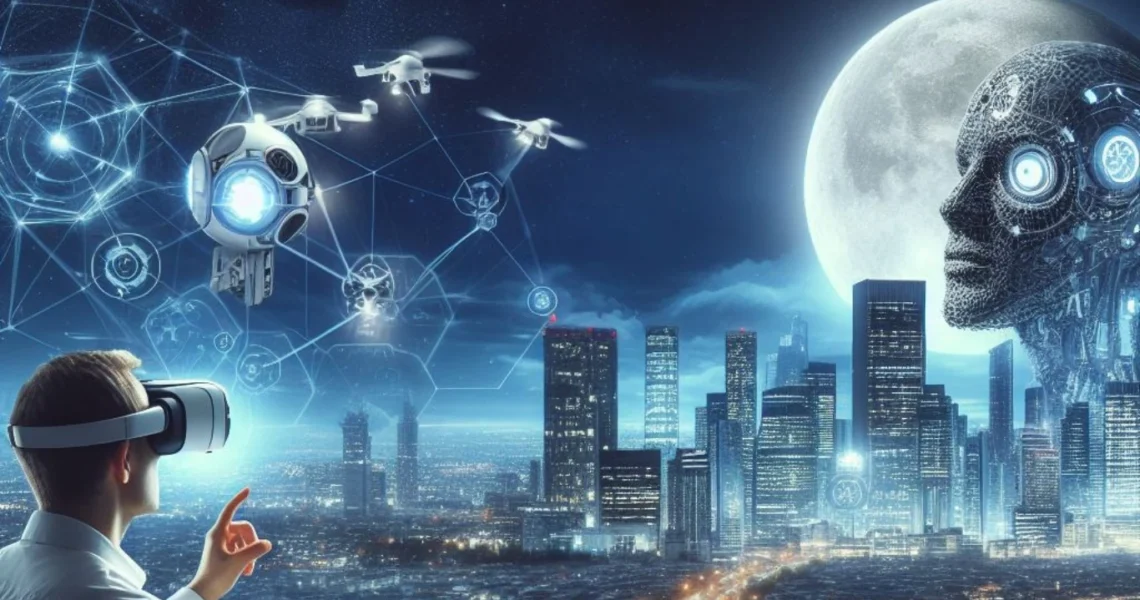Navigating Tomorrow: The Transformative Power of Embracing Artificial Intelligence in the Digital Era
02/01/2024
In an era where the digital landscape evolves at an unprecedented pace, understanding and harnessing the power of Artificial Intelligence (AI) has become a paramount skill for both individuals and organizations.
The exponential growth of AI is not merely a technological advancement; it signifies a profound revolution, reshaping industries, redefining roles, and presenting unparalleled opportunities for those willing to embrace its potential.
AI, in essence, refers to the development of computer systems capable of performing tasks that typically require human intelligence. These tasks range from problem-solving and learning to perception and language understanding. Machine learning, a subset of AI, empowers systems to improve their performance over time without explicit programming.
Statistics paint a compelling picture of AI’s current influence. According to a recent survey by PwC, 52% of companies worldwide have already integrated AI into their business processes. In addition, the McKinsey Global Institute estimates that AI has the potential to create an additional $13 trillion in global economic value by 2030.
In the current landscape, we cannot ignore the benefits that the adoption of AI brings.
1. Improved Efficiency and Productivity:
Harnessing AI streamlines processes, automates routine tasks, and enhances overall efficiency. This leads to a significant boost in productivity as employees can focus on more complex and value-driven activities.
2. Enhanced Decision-Making:
AI systems process vast amounts of data in real-time, providing actionable insights that can significantly improve decision-making processes. This not only reduces the margin of error but also enables organizations to make informed strategic choices.
3. Personalized Customer Experiences:
AI algorithms analyze customer data, enabling organizations to tailor products and services to individual preferences. This personalization not only improves customer satisfaction but also contributes to increased loyalty.
4. Innovative Problem-Solving:
AI fosters innovation by addressing complex problems through predictive modeling and data analysis. This opens new avenues for creativity and problem-solving within organizations.
The Human Touch in a Digital World
Contrary to fears of job displacement, embracing AI in the workplace does not negate the significance of human skills. In fact, it complements and enhances them. Routine tasks that can be automated free up time for employees to focus on creativity, critical thinking, and relationship-building areas where human intuition and emotional intelligence shine.
Leaders play a pivotal role in driving the integration of AI within organizations. By fostering a culture of continuous learning and innovation, leaders can empower their teams to adapt to the changing landscape. Training programs that equip employees with AI skills ensure a smooth transition and create a workforce that is not only tech-savvy but also agile in the face of evolving technologies.
The Road Ahead
As we stand on the cusp of a digital revolution propelled by AI, the importance of acquiring AI skills cannot be overstated. Organizations that understand and leverage the transformative power of AI will not only survive but thrive in an era of unprecedented change. It is not a question of if, but when, as we collectively navigate the vast opportunities presented by the fusion of human ingenuity and artificial intelligence.
In contemplating this intersection of human potential and technological innovation, one cannot help but wonder: What new horizons will AI unlock for industries that dare to explore its full potential? How will the dynamics of the workplace evolve as AI becomes an integral part of our daily operations? Moreover, what role do we, as individuals, play in shaping this narrative? Is our readiness to embrace AI skills a testament to our adaptability in a rapidly changing professional landscape?
The fusion of human creativity and the computational prowess of AI prompts us to reflect on the nature of work itself. What aspects of our roles can be enhanced by AI, allowing us to focus on tasks that demand uniquely human qualities? How can we ensure that the integration of AI in the workforce aligns with ethical considerations, fostering a harmonious coexistence between man and machine?
As we peer into the future, envisioning a landscape where AI is not just a tool but an integral part of our professional identity, the questions become more nuanced. How can leaders nurture a culture that encourages continuous learning, ensuring that employees are not left behind in this transformative journey? What steps can organizations take to demystify AI, making it accessible and comprehensible to a broader spectrum of their workforce?
Indeed, the advent of AI is not merely a technological revolution; it is a paradigm shift that invites us to explore the very essence of what it means to be human in a digitally driven world. So, dear readers, as you contemplate the integration of AI into your professional sphere, what questions arise in your mind? How do you envision your role in this unfolding narrative, and what steps are you willing to take to embrace the boundless opportunities that lie ahead?